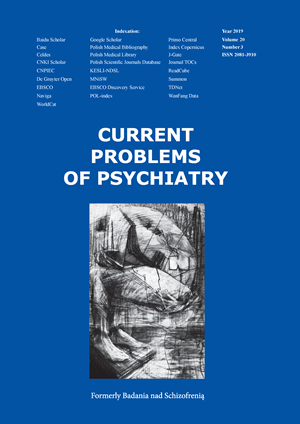The impact of emotional intelligence level on the depression vulnerability
DOI:
https://doi.org/10.2478/cpp-2019-0011Keywords:
emotional intelligence, depression, emotions, feelingsAbstract
Introduction. Recently the issue of emotional intelligence has become a widespread theme of discussion. This review paper is made a contribution to this debate. Discovering of effective predictive and protective factors for depression would have farreaching consequences for society, science and economy.
Material and Methods. To investigate this issue, we searched articles available in the Google Scholar and PudMed databases under the following terms: emotional intelligence, depression, emotional intelligence and depression for the years 1999-2019. Accessible literature allowed to show basic information of emotional intelligence, detect a system of relationships between emotional intelligence level and depression, and present recommendations.
Results and Discussion. The result of this analysis is a statement that all components of emotional intelligence can be a defense against depression. People with high abilities in regulation their own emotions have large social support, what protect them against depression. The capable managing one’s own and others’ emotions create large and deep interpersonal relationships, what provide more emotional support and tangible assistance during everyday challenges. Stressful life events are among the most powerful predictors of depression, and high level of emotional intelligence enable to cope with them more effectively.
Conclusions. The present text will constitute an impulse to explore this theme more. Moreover, there is a recommendation for researchers to create more effective and simplified tests for examining the level of emotional intelligence in case of spreading them much more and use them in a routine psychiatric practice. A confirmation of the title hypothesis can stand a key to struggle with depression.
References
1. Shabany M., Ghajarzadeh M. Emotional Intelligence and Depression Among Hospital Nurses of Tehran University of Medical Sciences. Arch Neurosci., October 2018; 5(4): e70734.
2. Motahari A.A., Rahgozar S. Inhibitory Role of Emotional Intelligence in Committing Suicide. Indian J. Sci. Technol., November 2011; 4(11): 1601-1606.
3. Rahgozar S., Motahari A.A., Zolali A. Assessing Bar-On’s Emotional Intelligence Components Among Normal Subjects and Those of Having Suicide Trial Record. Indian J.Sci.Technol., October 2011; 4(10): 1391-1395.
4. Downey LA, Johnston PJ, Hansen K, Schembri R, Stough C, Tuckwell V, et al. The Relationship Between Emotional Intelligence and Depression in a Clinical Sample. Eur.J.Psychiat., 2008; 22(2): 93-98.
5. Al-Tarawneh A.A., Nizami N. Relationship Between Emotional Intelligence and Adolescents’ Depression. Inter.J.R., April 2016; 3(8): 39-44.
6. Bar-On R. The Bar-On Model of Emotional-Social Intelligence. Psicothema, February 2006; 17.
7. Rode J. The Protective Effects of Social Support on Postpartum Depression: Does Emotional Intelligence Matter?, Cincinnati; M.S. Indiana University-Purdue University-Indianapolis: March 2013.
8. Du Plooy H. The Relationship Between Emotional Intelligence and Suicide Behaviour Among South African Adolescents, Bloemfontein; University of The Free State: January 2017, s. 50-90.
9. Sapra M. A Study of Stress, Anxiety and Depression in Secondary School Students in Relation to Their Emotional Intelligence. Inter.J.Ad.Res.Develop., January 2018; 3(1): 361-366.
10. Parihar N., Jha M. Role of Emotional Intelligence, Gender and Culture in Depression. J.Hum.S.Sci., February 2015; 20(2): 33-36.
11. Du Plooy H. The Moderating Role of Emotional Intelligence in The Relationship Between Psychosocial Factors and Suicide Behaviour in South African Adolescents, Bloemfontein; University of The Fr ee State: January 2017, s. 91-154.
12. Martowska K. Inteligencja Emocjonalna Licealistów a Oddziaływania Wychowawcze Rodziców. Ruch Pedag., 2009; 3(4): 55-69.
13. Goleman D. Inteligencja emocjonalna w praktyce. Poznań: Media Rodzina; 1999.
14. Henne K. Kompetencja Społeczna i Inteligencja Emocjonalna a Zaangażowanie w Internet. Psychologia Jakości Życia, 2003; 2(1): 111-130.
15. Caban J.M., Rewerski T. Inteligencja Emocjonalna i Kompetencje Społeczne u Osób Pracujących i Bezrobotnych. Polityka Społ., 2005; 2: 8-10.
16. Stańczyk J., Gajdziszewska-Dudek P. O Znaczeniu Inteligencji Emocjonalnej w Życiu Zawodowym. Zeszyty Nauk.Politech. Śląskiej, 2015; 85: 507-516.
17. Wróbel M. Emotional Labor and Burnout in Teachers: The Moderating Role of Emotional Intelligence. Psych.Społ., 2013; 24(1): 53-66.
18. Ogińska-Bulik N. Stres Zawodowy i Jego Konsekwencje w Grupie Pracowników Sektora Usług Społecznych – Rola Inteligencji Emocjonalnej. Przeg.Psych., 2008; 51(1): 69-85.
19. Sadowska M., Brachowicz M. Struktura Inteligencji Emocjonalnej. KUL, 2008; 15: 65-79.
20. Szczygieł D. Inteligencja Emocjonalna i Powodzenie Szkolne. Psych.Roz., 2005; 10(1): 59-68.
21. Karwowski M. Inteligencja “Akademicka”, Emocjonalna i Zdolności Twórcze Uczniów o Różnych Osiągnięciach Szkolnych. Stud. Psych., 2004; 5: 103-115.
Downloads
Published
Issue
Section
License
Copyright (c) 2019 Authors

This work is licensed under a Creative Commons Attribution-NonCommercial-NoDerivatives 3.0 Unported License.


